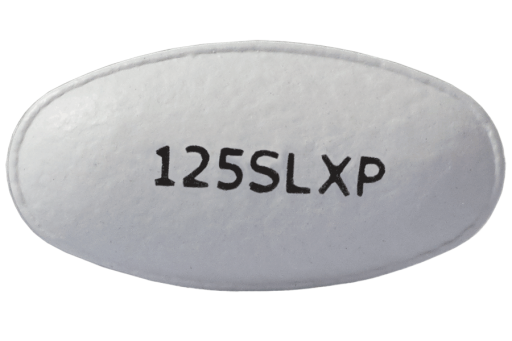Mytesi
crofemeler

Standard Dose
One 125 mg delayed-release tablet taken twice a day, with or without food. The tablet should be swallowed whole and not crushed or chewed.Mytesi (crofelemer) is the first, and only, anti-diarrheal indicated for the symptomatic relief of non-infectious diarrhea in adults with HIV/AIDS on antiretroviral therapy. Currently, what is typically recommended is for the patient to take medication(s) with food and/or use Imodium (loperamide) for symptomatic diarrhea.
Mytesi approval was based on a randomized, placebo-controlled study of 374 people living with HIV who had about three watery stools per day and were on anti-HIV medicines. At study entry, people experienced an average of approximately 20 watery stools per week. To be considered effective, watery stools had to be decreased to two or fewer per week, which occurred in 18% of Mytesi-treated people vs. 8% of placebo-treated people at 4 weeks. In an open-label extension phase of the study, about 50% of the people reported two or fewer watery stools per week at 3 months, an effect which was maintained until study end at 6 months. These findings suggest that it may take some time to achieve the optimal effect. Mytesi appears to work best in people who have tried and failed non-prescription anti-diarrheals, have had diarrhea for more than two years, have more than two watery bowel movements per day, and whose bowel movements tend to be “pourable” (not clumpy). Mytesi was less effective in African Americans in this clinical study.
An infectious cause should be ruled out prior to initiating Mytesi. In the placebo-controlled part of the study, side effects were comparable to placebo. The most commonly reported side effect was upper respiratory tract infection (Mytesi, 3.8% of people vs. placebo, 2.9%). Other reported side effects included bronchitis, cough, flatulence (gas), and increased bilirubin. Based on animal data, Mytesi may cause fetal harm. Mytesi has not been studied in people younger than 18 years old. Its usefulness in pediatrics is unknown and use in this population cannot be recommended at this time.
There were no significant drug interactions in participants in the clinical study. There was little or no change in CD4 counts and viral load throughout the study.
Manufacturer
Napo Pharmaceuticalsmytesi.com; (844) 722-8256
AWP
Not available on formulary usedPotential Side Effects and Toxicity
An infectious cause should be ruled out prior to initiating Mytesi. In the placebo-controlled part of the study, side effects were comparable to placebo. The most commonly reported side effect was upper respiratory tract infection (Mytesi, 3.8% of people vs. placebo, 2.9%). Other reported side effects included bronchitis, cough, flatulence (gas), and increased bilirubin. Based on animal data, Mytesi may cause fetal harm. Mytesi has not been studied in people younger than 18 years old. Its usefulness in pediatrics is unknown and use in this population cannot be recommended at this time.
There were no significant drug interactions in participants in the clinical study. There was little or no change in CD4 counts and viral load throughout the study.
More Information
In a review article in Expert Review of Clinical Pharmacology published in 2015 by Castro et al., the use of Mytesi is recommended as a reasonable choice in people not responding to over-the-counter psyllium and loperamide. Patients should be informed that the benefits of Mytesi are not immediate, possibly taking about four weeks, and if an inadequate response is seen after three months, Mytesi should be discontinued.
CAP & PAP Information
Co-pay program: (877) 336-4397
Pay no more than $25, maximum benefit of $6,000 per year.
PAP: (888) 527-6276


